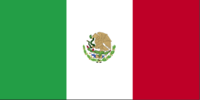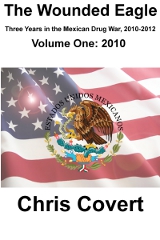Antonio Guillen's Capture Reveals Cracks in Drug War News

2010-11-12
Posted by: badanov
by Chris Covert
The Mexican Secretaria de Marino (SEMAR) was rightly proud of the conclusion of the operation to capture Gulf Cartel Matamoros commander Antonio Ezequiel Cardenas Guillen in a press conference earlier this week, having provided to the press via a You Tube video a summary of its six month long campaign.
Both commanders on the ground, and their commanders in Mexico City as well as Mexican federal authorities may have a much, much bigger problem than just taking down violent drug lords and their armed wings on the eastern Mexican seaboard. And it could well be Mexican politics that decides whether the drug crime problem in Mexico is ultimately resolved.
Since I started with northern Mexican as my "beat" for Rantburg.com, at least until last month if I wanted news about Mexican Army operations in Tamaulipas, I had to go to news websites other than in Tamaulipas. None of news outlets in Tamaulipas, especially in the border cities of Matamoros, Reynosa and Nuevo Laredo published much in the way of crime news.
The difference between those news outlets and those in Juarez have been startling. Juarez has at last count five daily newspapers which operate in the city itself. All five in my opinion bravely report drug crime/drug war news routinely and critically on a daily basis risking the lives of publishers and editorial personnel alike to get the news out.
In Tamaulipas, at last since last summer on a given day when a gun battle was taking place, you could find nothing, but civic and social news in local news outlets. It was almost as if drug war news was being airbrushed.
Comments of readers in the Blog del Narco hinted that some of the reason why news outlet in those cities refused to report on drug war news was that they were owned or under extorted by Mexican drug gangs. Whether that is plausible, I have zero idea.
I do know in Juarez members of La Linea, the armed wing of the Juarez drug cartel boasted this passed summer that they often timed their crimes with local news., so I regard the idea that cartel influence publications to deny the public information hard to credit.
One possible answer why is contained within a report published by the Mexican national news outlet, APRO, which is the news agency of Proceso magazine. The report points to reports it received that said some elements in the Tamaulipas state and municipal police may have helped Guillen escape a Mexican Marine September 8th attempt at capture.
Said APRO in a report published last week:
"The Sept. 21 media reported, based on data from the PGR, which allegedly Ezequiel Cardenas was arrested in Matamoros during clashes between gunmen and soldiers few days earlier.
According to these versions, the afternoon of September 8 was a four-hour firefight in a building of the Del Rio subdivision, where the boss was entrenched.
In the preliminary PGR/TAMPS/MAT-III/2466/2010 is told that unofficially it was learned: that inside the damaged building was Tony Tormenta, who was not caught.
The letter includes testimonials from people who witnessed the shooting. Witnesses said Ezequiel Cardenas walked out of the building and no uniformed blocked his way."
How does this conflate to Mexican journalism and its failures in Tamaulipas?
In nearly every other northern Mexican state Mexican news outlets rely on the state attorney general's (PGJE) office for their news, and there is a practical and professional reason for this. When a crime get committed, it is the state attorneys general who usually get the preliminary reports, who then work with police and its own personnel on the scene to process information, which then gets released to the press.
Some states use their official websites, others have conference calls transmitting information. That's the practical reason.
While it may seem strange to Americans since we regard police news as public record and we expect our reporters to develop their own news, Mexican press seem to like the current set up. It saves time and resources if the PGJE's do the minutia; to separate the wheat from the chaff, if you will.
A professional reason is that Mexican press is vigorous and sometimes boisterous with information. News outlets routinely use untrained Mexican writers who use regional idioms and dialects to report the news. Facts can get lost in translations and sometimes facts are distorted. The State PGJEs activity in providing crime information also serves to temper that enthusiasm as well.
What happens when the PGJE flat refuses to provide any information as a matter of policy? What you get is Tamaulipas and a virtual blackout of news.
To be fair, there may other reasons, such as for public safety that news about roadblocks, a common tactic with Los Zetas, are not reported, however, city officials from border cities are often left with Twitter, Facebook and other social media to provide concurrent information about such events so that they can warn the general public about imminent danger.
But working the other wide of the argument that the dearth of drug and gang crime news goes to the top, what if the PGJE has nothing to report? What if cartels have police commanders at the municipal and state level on the payroll, so that as soon as a shooting takes place, police personnel go to the area, call ambulance staff to cart off the bodies and then tell the PGJEs there's nothing to see, no news?
Whatever the reason for reporting, we know the drug war rages on in the border cities of Tamaulipas whether information gets out or not. We get to rely on sources often outside of Tamaulipas such as SEMAR and SEDENA for news about shootings and other crimes.
One final note which points to a screaming need for better official information in Tamaulipas:
Last Friday evening someone posted in the O-club news that 47 individuals had died in Matamoros that day, sourced from the Brownsville Herald, which got the news from an unnamed source.
I do not like using unnamed sources, and I never have. Oftentimes when writing news using unnamed sources,you get a lot of agenda, with a smidgen of truth. Very good reasons sometimes exist for using an anonymous, for example, if the source is in imminent danger, or if you need a quote that no one else is willing to say as identified.
But anonymous sources can just as easily burn the organization as the person providing information. They can cheapen whatever information that is in an article that is untainted by the agenda of the source. It is besides that a crappy way to run a free press.
In the case of Guillen's capture the huge death toll sent out a red flag, so combing through the Mexican publications I normally use and through Google, I found confirmed eight and later, nine dead, total. I also found that El Universal and other publications had already picked up the story, including the Associated Press, which probably dropped the story on its international wires.
How did the press get the story so wrong?
I have several theories, the most likely being a Brownsville Herald staffer, perhaps hired on temporarily for election coverage, wanted to show the publication that he or she had the mad skills needed to report on Mexican drug crime news probably spoke to someone from Mexico over the phone and misinterpreted 47 captured to 47 killed. That, or misinterpreted AK-47 to 47 killed.
Whatever the ultimate explanation, a diligent Tamaulipas PGJE would have provided the information accurately and quickly, and this little lapse in judgment would never have occurred.



